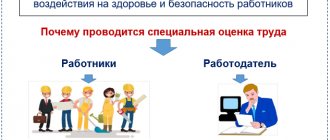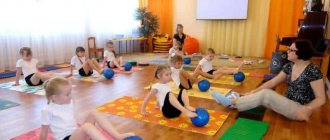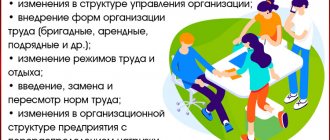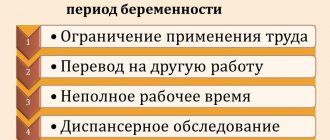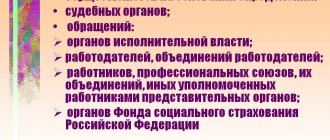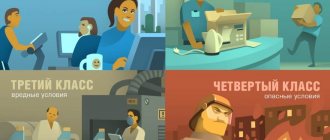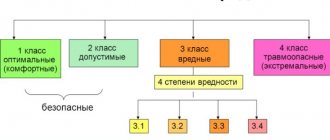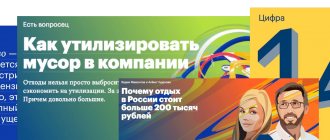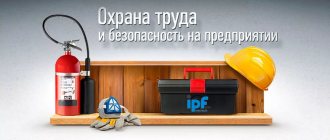Updated 04/22/2019
Currently, the procedure for carrying out a special assessment of working conditions is strictly mandatory for both micro-enterprises and large corporations. This requirement is established by Federal Law No. 426-FZ dated December 28, 2013 “On special assessment of working conditions.” At the same time, Article 8 of this regulatory legal act states that the implementation of the Specialized Monitoring System must be entrusted to a specialized organization that has the necessary characteristics and meets the requirements established by current legislation. One of these requirements is the need to enter data about it into the register of organizations conducting special assessments.
Why do you need a SOUT registry?
The register is needed to search for organizations or experts providing SOUT services, as well as to check any organization to find out whether it has the right to provide such services or not.
Previously, we wrote that companies that have jobs must conduct a special assessment of working conditions when creating a job, and then, once every 5 years. At the same time, according to Russian legislation, the assessment cannot be carried out independently. To do this, you need to contact a specialized organization that has the right to provide SOUT services. Such organizations are subject to control and accounting by the state. Accounting for all SOUT organizations is carried out in the register on the website of the Ministry of Labor. You can use the Ministry of Labor's SOUT registry to find any of them.
On the website you can find a list of organizations that conduct special assessments of working conditions, as well as view the register of accredited labor protection organizations that perform the functions of a labor protection service or a labor protection specialist for an employer whose number of employees does not exceed 50 people.
What is the purpose of a special assessment of working conditions?
Employers are required to provide a specialized accredited organization engaged in conducting special labor assessments with information and documentation related to ensuring labor safety at the enterprise.
Employers are required to allow representatives of the organization with which a written contract has been concluded to inspect workplaces at the company and collect material for drawing up a report. Upon completion of the inspection the following must be carried out:
- assessment of the effectiveness of the functioning of personal protective equipment purchased by the company’s management and issued to employees;
- determination of a list of factors that could cause harm to the health of workers when performing their work duties;
- calculating deviations from standards for indicators and recording exceeded limits;
- identifying the level of negative impact of various production factors and all harmful factors in aggregate.
Requirements for organizations included in the register
According to Resolution No. 599 of June 30, 2014, firms that meet the following requirements are placed in the register of accredited labor protection organizations:
— the company has a testing laboratory, which is necessarily accredited by the Federal Accreditation Service; — the company employs at least five experts who have been certified to conduct special assessments. An employment contract must be concluded with each expert. At least one of the experts must have a higher education as a doctor in the field of occupational hygiene.
The register of SOUT experts includes persons who meet the following requirements:
— the expert must have higher education; — in the absence of specialized education, the expert must have confirmation of advanced training in relevant training programs for assessing working conditions lasting at least 72 hours. — the expert must be able to assess working conditions and have at least 3 years of work experience in the field of labor protection, including in the labor protection system.
The procedure for conducting a special assessment of working conditions
The law outlines the following stages of conducting a special assessment of working conditions:
- Carrying out activities aimed at identifying hazardous production factors.
- Conducting an analysis of harmful and dangerous factors by recording the results of measurements and laboratory tests.
- Comparison of the obtained test results with the standards of hazard classes, determination of the class and subclass of each factor according to the degree of harm.
Part 2 of Article 22 of Federal Law No. 426-FZ contains a list of categories of persons who do not have the right to conduct SOUT. These include:
- the founder of the enterprise in respect of which a special assessment of working conditions is being carried out;
- officials working in executive authorities and specializing in supervisory activities in the field of labor and conducting special assessments;
- persons and organizations that are interdependent in relation to the company being audited;
- relatives of the founders of the company, which is checked for the presence of harmful and dangerous production factors.
| ★ Best-selling book “Accounting from scratch” for dummies (understand how to do accounting in 72 hours) > 8,000 books purchased |
How to use the SOUT registry?
After going to the official website of the Ministry of Labor, you have the opportunity to:
— set search criteria for the desired organization (expert) , for example, if you know the name of the organization, TIN or number of the organization (expert) in the register. To do this, enter the desired value in the appropriate field and click “FIND”.
— view in the register all organizations (all experts) providing SOUT services. To do this, just scroll down the page and familiarize yourself with the list of companies (experts). This method is not very convenient, because... requires endless scrolling of the list until the desired company is found. It is also possible to download all organizations into an Excel file. To download, click on the “Export to csv” button.
— look at organizations registered in a specific region of Russia . To do this, you need to scroll down the page a little and find the “Subject (number of organizations)” field. Select the desired region and click the “FIND” button. We recommend this method of searching for organizations and experts, because... in this case, you can see all organizations in your region of residence and select one of them to receive SOUT services.
Documentation of the results of a special assessment
The results of the special assessment and assessment process will be recognized by all regulatory authorities if the assessment of the “harmfulness” of production was carried out by an accredited organization mentioned in the register of such companies. Based on the results of the inspection, the working conditions will be assigned a level of “harmfulness”:
- optimal (if no negative factors are identified);
- acceptable (if working conditions are not ideal, but production factors do not threaten the health and life of employees);
- harmful (if some production factors or their combination have a negative effect on the employee’s body, and he may get an occupational disease);
- dangerous (if during work employees are exposed to harmful factors that lead to occupational diseases, premature mortality and the birth of unhealthy offspring).
What information does the Ministry of Labor's register on SOUT contain?
According to the Rules for the admission of organizations to carry out a special assessment of working conditions, approved by Decree of the Government of the Russian Federation dated June 30, 2014 N 599, the following information is entered into the register of organizations conducting a special assessment of working conditions:
— the name of the organization and its location, as well as the name and location of its branches (additional offices); — TIN; — OGRN; — company registration number; — the date when the company is entered into the register of the Ministry of Labor according to SOUT; - the date from which the company suspended its activities under the SOUT. (The suspension of activities can be carried out by the organization independently, but most often at the request of state supervision authorities, in the event that such a company does not meet the requirements of the law); - the date from which the company resumed its activities in providing SOUT services based on the decision of state authorities. supervision; — date of termination of the company’s activities in the field of SOUT. Despite the fact that the company is on the list, it does not have the right to provide SOUT services.
The following information is entered into the register of SOUT experts:
— full name of the expert; — details of the expert certificate (certificate number, validity period, issue date and expiration date); — area of activity; — date of termination of the SOUT expert certificate.
Registry search
An entry about any organization entered into the SOUT register is confirmation of its right to carry out activities related to the special assessment of working conditions. In order to find out which organization provides services in the desired region and whether it has the appropriate accreditation, users can use a special search form posted on the website.
You can search using the following parameters:
- Company name;
- TIN;
- OGRN;
- district;
- date of entry into the register;
- date of suspension of activity;
- date of termination of activity;
- status of the organization.
In the register of SOUT experts, you can “drive” the following parameters into the search bar:
- FULL NAME. expert;
- certificate number;
- date of issue of the certificate and expiration date of its validity.
In total, the register includes about 5,000 experts who have the right to conduct special assessments.
Why is SOUT carried out?
The results of a special assessment of working conditions are used in a number of cases, such as:
- providing employees with guarantees and compensation for working in harmful or dangerous working conditions;
- development and implementation of measures to bring working conditions into compliance with state regulatory requirements for labor protection;
- providing workers with personal protective equipment, as well as installing collective protective equipment;
- monitoring the state of working conditions in the workplace;
- organization of mandatory preliminary medical examinations upon entry to work and periodic medical examinations;
- assessment of the level of professional risks;
- investigation of industrial accidents and occupational diseases, etc.
The provisions of the Federal Law of December 17, 2001 No. 173-FZ “On Labor Pensions in the Russian Federation” establish a list of persons to whom an old-age labor pension is assigned before reaching the age of 60 years - for men, 55 years - for women.
From January 1, 2013, employers of such persons are required to transfer additional insurance contributions to the Pension Fund to finance the insurance part of their labor pension at the following rates:
- in relation to payments in favor of individuals who are employed, incl. in jobs with hazardous working conditions: 6 percent (2014), 9 percent (2015 onwards);
- in relation to payments in favor of individuals who are employed in jobs with difficult working conditions, work with increased intensity and severity): 4 percent (2014), 6 percent (2015 and onwards).
Federal Law No. 212-FZ of July 24, 2009 provides the opportunity to be exempt from paying additional insurance premiums based on the results of a special assessment of working conditions:
- 1 (optimal) class of working conditions - 0% additional insurance premium;
- 2 (permissible) class of working conditions - 0% additional insurance premium;
- 3.1 (harmful) class of working conditions - 2% additional insurance premium;
- 3.2 (harmful) class of working conditions - 4% additional insurance premium;
- 3.3 (harmful) class of working conditions - 6% additional insurance premium;
- 3.4 (harmful) class of working conditions - 7% additional insurance premium;
- 4 (dangerous) class of working conditions - 8% additional insurance premium.
Legislative acts
All the main regulatory provisions for conducting labor assessment are reflected in the Labor Code of the Russian Federation. In addition to these norms, an additional law was adopted, where all the nuances of the implementation and results were discussed in more detail (December 28, 2013 No. 426-FZ).
The Ministry of Labor, in turn, approved Order No. 33n, which regulated several documents:
- methodology for conducting assessment;
- classification of hazardous production factors;
- assessment report form;
- detailed instructions for filling out this form.
Organizations conducting special assessments of working conditions
The right to conduct a procedure for special assessment of working conditions
(SOUT - Special Assessment, - ed.) still belongs to organizations providing workplace certification services (ARM, - ed.), but from January 1, 2019, only specialized organizations that are accredited for the right should remain in the field of providing special assessment services carrying out work on SOUT. Despite the fact that this is a completely new procedure in the legislation, the Ministry of Labor still decided to make a smooth transition, both in relation to employers and in relation to certifying organizations, hence the extension of the deadlines:
Quote:
'We have prescribed the transitional norms very correctly. All companies that work in this area will continue to work until their accreditation certificate expires. Currently, 900 such organizations are registered in the register of certifying organizations. All of them will retain the right to carry out SOUT'
First Deputy Minister of Labor and Social Protection of the Russian Federation S.F. Velmyaykin states in an interview with Rossiyskaya Business Newspaper.
In accordance with the transitional provisions, relief was given even to those organizations whose accreditation certificate expires in 2014. Regardless of what month and what date this happens, the organization conducting the automated work system has the right to provide services under the SOUT inclusive until December 31, 2014. According to the analysis of the Ministry of Labor, in this year, about 150 companies will have their testing laboratory accreditation certificate expire.
Requirements for organizations conducting SOUT
In accordance with the Federal Law “On Special Assessment of Working Conditions” dated December 28, 2013 No. 426-FZ, the organization conducting the special assessment must meet the following requirements:
- Carrying out special operational activities must be presented in the statutory documents as one of the main types or one of the types of activities of the organization;
- The presence in the organization of at least 5 experts in the special assessment of working conditions, working under an employment contract, and one of them must have a higher education in the specialty - a doctor in hygiene or in sanitary-hygienic laboratory research;
- The presence of a structural unit - an accredited laboratory that has the right to carry out research and measurements of harmful and hazardous factors in the working environment (HEPF - ed.) and the labor process.
The SOUT organization has the right to involve other accredited laboratories in work under a civil contract, but only in terms of measuring the following types of factors: energy exposure to laser radiation, radioactive contamination of production premises, personal protective equipment and the skin of workers, X-ray and neutron radiation, biological factors . The law provides for such cooperation because not all testing centers have permission to measure these types of factors, moreover, the purchase of equipment for them is one of the most expensive.
Expert of the organization conducting SOUT
An expert on SOUT can be an organization specialist who has worked in a laboratory for at least 3 years, has been certified by the Ministry of Labor and has an expert certificate for the right to perform work on SOUT.
Expert certification
was introduced for the first time in the Ministry of Labor. It is open to persons who have a higher education, practical work experience in laboratory centers, and additional training in SOUT in educational institutions for at least 72 hours. Certification for applicants to become experts takes place in two stages - completing test tasks and an interview. If the certification commission makes a satisfactory decision, the specialist receives the right to carry out special assessment work in a certain area. The Regulations on the Certification of Experts provide for 5 such areas: identification of VOPF and the labor process, measurement and study of biological factors, measurement and study of chemical factors, measurement and study of physical factors, and measurement and study of harmful and hazardous factors in the labor process. There is no requirement that each expert must undergo certification strictly in all 5 areas, so each specialist can choose the most acceptable for himself. In the future, the expert can undergo certification in another area.
Based on the results of certification, experts receive a certificate for the right to perform work according to SOUT, which is valid for 5 years. But since the special assessment expert was entrusted with enormous functions with the introduction of the new procedure, for any unreliable and incompetently carried out assessment, he may lose not only his certificate, but also be held administratively liable. Fines and sanctions were introduced for the first time for experts. You can find out more about the amounts and types of administrative liability for them, as well as for organizations conducting special assessments, in the material: “Fines and sanctions for special assessments”.
Let us note that the law also provides for transitional provisions for experts. Due to the fact that the training of experts and their subsequent certification in the Ministry of Labor takes a lot of time, the provisions on Special Labor Standards allow persons working in organizations under an employment contract and admitted to work in testing laboratories as of the day the Federal Law came into force to perform the duties of experts, but no later than December 31, 2014.
Liability insurance by organizations according to SOUT
Each organization can ensure the fulfillment of its obligations associated with the risk of property liability
for obligations arising from damage to employers and employees through voluntary insurance.
When developing the federal law, more precisely, in the first version of the bill, the requirements of this paragraph were mandatory for all organizations. Without compulsory insurance, organizations were not allowed to carry out work under SOUT. But the certifying organizations were able to defend their right, and the clause of the law has already become voluntary.
Register of organizations conducting special assessments
All information about the activities of organizations conducting special assessments is stored in the public domain on the official website of the Ministry of Labor in a special register. It contains the following information:
- Full name of the organization and location;
- TIN;
- Main state registration number;
- Registration number of the entry in the register of organizations;
- Date of entering information about the organization;
- The date of the decision to suspend activities and the grounds for its adoption;
- The date of the decision to resume activities with the grounds for resumption.
If a decision is made to terminate the organization’s activities in the field of provision of services and work on SOUT, an entry is also made in the register and the legal grounds for this are given.
Organizations conducting special assessments and employers must be in close cooperation as work is carried out. The organization must take lawful actions, the employer must not interfere with research and provide all the necessary information and documents characterizing working conditions. If one of the parties violates the rules, each of the participants may refuse to conduct the SOUT.
The main principle that an SOUT organization must observe is the principle of independence. No matter what, the result must be reliable and objectively reflect the state of working conditions in the workplace.
If you find an error, please select a piece of text and press Ctrl+Enter.

